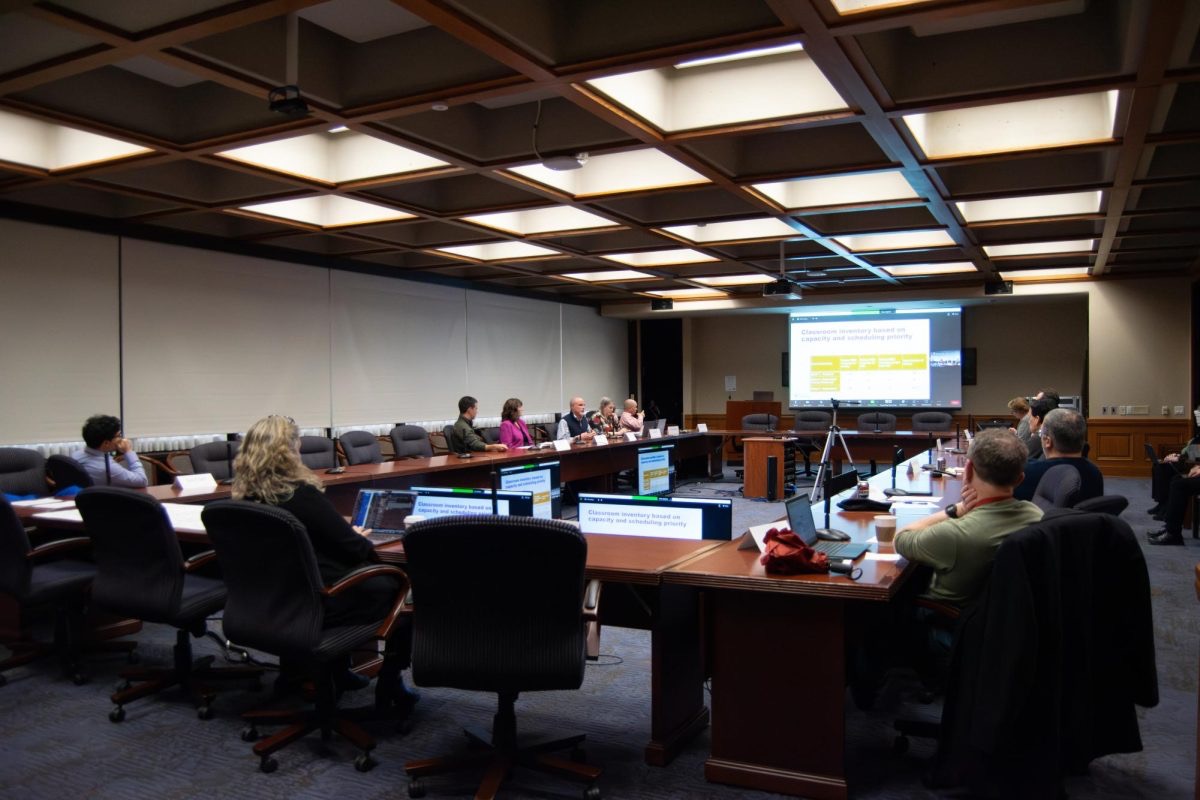President Robin Kear opened the first Faculty Assembly meeting of the fall semester by addressing the recent acts of violence against two Jewish students on campus.
“I would like to acknowledge the harm done to our Jewish community on campus through a violent act by a non-Pitt affiliate,” Kear said. “I’ve heard from several of you on ways to improve the message timing, and I’m bringing that forward to administration. Hopefully, we can learn from that incident.”
The meeting was held Wednesday afternoon at 3 p.m. in room 2700 Posvar Hall and over Zoom. After addressing campus violence, Kear discussed the recent finalization of the Faculty Union’s collective bargaining agreement, which focuses on securing higher pay through negotiations between the union and the University. The agreement does not include faculty in the School of Medicine.
“The Senate is examining the best ways to keep the School of Medicine faculty’s voice strong in all matters of shared governance,” Kear said. “[We’re working on] how to approach ongoing topics which have been bargained for a portion of faculty, but not all.”
Kear shared an update on the English Language Institute, a program offering English as a Second Language courses to international students. The program announced its closure in December 2022 due to declining enrollment and financial challenges stemming from the pandemic.
“The Office of the Provost has agreed to support the ELI for the next three years as it focuses on rebuilding enrollments,” Kear said. “The department of linguistics will continue to offer credit-bearing English language courses for international students.”
Dawn McCormick, director of the English Language Institute, said they “are looking to restart our marketing and recruitment activities. We hope to reconnect with the campus community and global partners.”
Kear announced a new process released to alleviate the testing center capacity issues which have been ongoing since the fall of 2023.
“The requirement is that faculty are required to complete an alternative testing agreement with [Disability Resource Services] at the start of the term to provide equal access for students,” Kear said. “A student will not be able to schedule an exam in the testing center until an alternative testing agreement is in place.”
Provost and Senior Vice Chancellor Joe McCarthy presented updates on the Plan for Pitt, an initiative launched in the fall of 2021 that outlines the University’s goals in funding, academics and employment.
“The Plan for Pitt is not a typical strategic plan that sits in the back of the drawer and collects dust,” McCarthy said. “This is essentially driving everything we do. The most important pillar is that we cultivate student success.”
April Belback, Associate Vice Provost for Student Success and Advising, presented information about a new undergraduate “shared advising” model that will roll out during the next few academic years. The advising model will give each student up to four advisers — an academic adviser, faculty mentor, program adviser and resource adviser.
John Stoner, professor in the history department, voiced concerns about potentially confusing students by assigning them multiple advisors.
“Students will need to know more people to advise them on an a-la-carte menu of things,” Stoner said. “I’m concerned that the dilution of responsibility for advising is actually going to make it much more difficult for students to develop relationships with faculty.”
McCarthy explained that the model is still in development.
“How do we functionally maintain that relationship? I’m not sure,” McCarthy said. “That’s part of why the [schools] who are early in the rollout are already as close to this perceived model as possible.”
The plan aims to increase graduation rates by giving students more than one advising destination, which is a focus in the Plan for Pitt, according to officials.
“I’m actually not bothered by 12 students out of 4500 not graduating,” Chris Bonneau, immediate past president, said. “That strikes me as an individual problem with certain advisers who aren’t doing their jobs. That does not scream, ‘Systematic problem that needs a complete restructuring.’”
John Brigham, associate professor in the engineering department, raised a question about costs needed to introduce the new advising model.
“It’s mostly going to cost me money, not the individual units,” McCarthy replied. “The return of investment on this program will be at least three-fold. This is not an investment I’m going to shy away from at all. I’m more than happy to hire the additional staff.”
Stoner proposed allowing departments the choice to opt out of the new advising model.
“Can the history department, for example, opt out of this?” Stoner asked. “Should we decide that our internal culture is really important to maintain?”
McCarthy responded, explaining that he would “be opposed” to an opt-out option if the model garners the success he expects.
“We’re really hoping to come up with a framework that works across the institution,” McCarthy said. “We’ll then have the implementation of that framework be tailored to the individual disciplines.”


